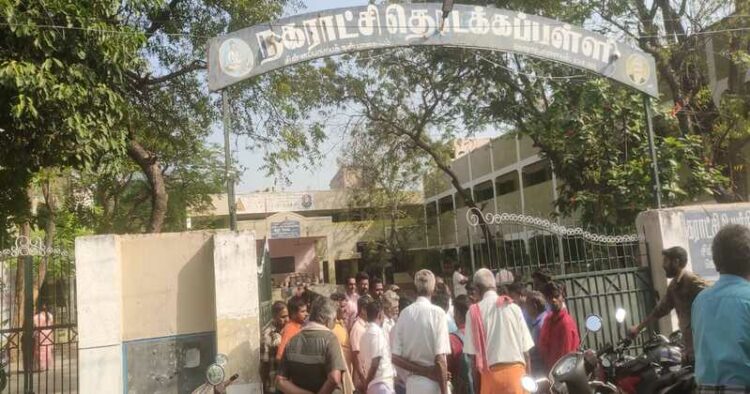In Chinnappa Naicken Palayam near Kumarapalayam in Namakkal district, Tamil Nadu, a school teacher’s objection to students wearing Sabarimala mala has sparked outrage, leading to protests by parents and Hindu Munnani workers. The incident occurred in the municipal school where teacher Balamurugan, affiliated with a church, reportedly penalised students for coming to school in black dress with Sabarimala malas around their necks. The mala, worn during the Ayyappa Swami Deeksha period, is a symbol of devotion after a 48-day penance. Parents gathered in front of the school, demanding action against the teacher, who allegedly punished students by making them kneel on the ground.
This incident echoes a similar case in 2019 when a student from TDTA Good Shepherd High School in Tuticorin district was penalised for wearing a mala and black shirts associated with Sabarimala. In that instance, the teacher directed the student to clean the toilets while still wearing the Deeksha dress, prompting police intervention and assurances from the District Education Officer for subsequent action.
The Ayyappa Swami Deeksha attire, including the mala, signifies a devotee’s observance of a 48-day penance and is worn during the pilgrimage to Sabarimala. The resistance by the school teacher has raised concerns about religious discrimination and infringement on the right to practice one’s faith.
The Hindu Munnani organisation joined the protest, emphasising the need for protection against discrimination targeting Sabarimala devotees in schools and educational institutions. The incident has reignited discussions about respecting religious practices and traditions, particularly during the period of Ayyappa Swami Deeksha.
Parents and Hindu Munnani workers are urging authorities to take appropriate action against the teacher, emphasising the importance of religious freedom and the right to observe religious practices without facing discrimination.
The National Commission for Protection of Child Rights (NCPCR) has taken note of such incidents, urging authorities to address the growing instances of religious bias within educational institutions.
In 2019, Promoth Bala, a 12-year-old student at the government-aided TDTA Good Shepherd High School in Tuticorin district, faced humiliation when his class teacher, upon seeing him in the Ayyappa Swami Deeksha attire with a mala around his neck, subjected him to punishment. The teacher allegedly instructed him to clean toilets in the same attire, resulting in burns on his hands from toilet cleaning acid.
In 2021, a teacher named Joyson at Anderson School in Kancheepuram reportedly scolded students wearing Rudraksha malas, branding them as “rowdy elements” and allegedly resorting to physical abuse. The incident gained attention after a video of the incident went viral on social media, prompting the withdrawal of two students from the school.
At Barren Brook Higher Secondary School in Bangla Surandai, Tenkasi district, four teachers, including two physical education teachers, compelled student Kalaivani to remove the vermillion mark on her forehead, which she refused to do.
Several instances highlight the discriminatory practices in different schools:
- In 2020, a Madurai-based Christian school reportedly charged students extra fees to visit a church for a special prayer before annual exams.
- In 2018, Cluny Matriculation School near Arani punished two girl students for wearing sacred ashes (chandan). The students were allegedly caned and made to kneel for two hours after their plaits came undone during an altercation.
- In 2017, Tiruchirappalli’s Servit Matriculation School at Keezhapudur punished students for bursting crackers during Diwali celebrations.
- In 2021, a mathematics teacher named Shanmugam allegedly forced two girl students to remove religious symbols, including bangles, flowers, sacred threads, and vermillion, while using obscene language. The teacher reportedly advocated atheism during lessons.
The NCPCR has raised alarms about the corporal punishment faced by students for wearing Rakhi, mehendi, and Tilak following Raksha Bandhan. The commission has issued a note to the Principal Secretaries of School Education Departments across states and union territories, urging them to address the issue.
While Tamil Nadu’s Directorate of School Education previously cracked down on schools segregating children based on wristband colors denoting caste, the NCPCR’s intervention highlights the double standards regarding religious symbols. The contrast in the treatment of Hindu children wearing Hijab versus those facing discrimination further exposes the issue of minority appeasement.

The incident in Chinnappa Naicken Palayam highlights the ongoing challenges faced by Sabarimala devotees, especially within educational institutions, and calls for a broader discussion on religious tolerance and freedom in the state.



















Comments